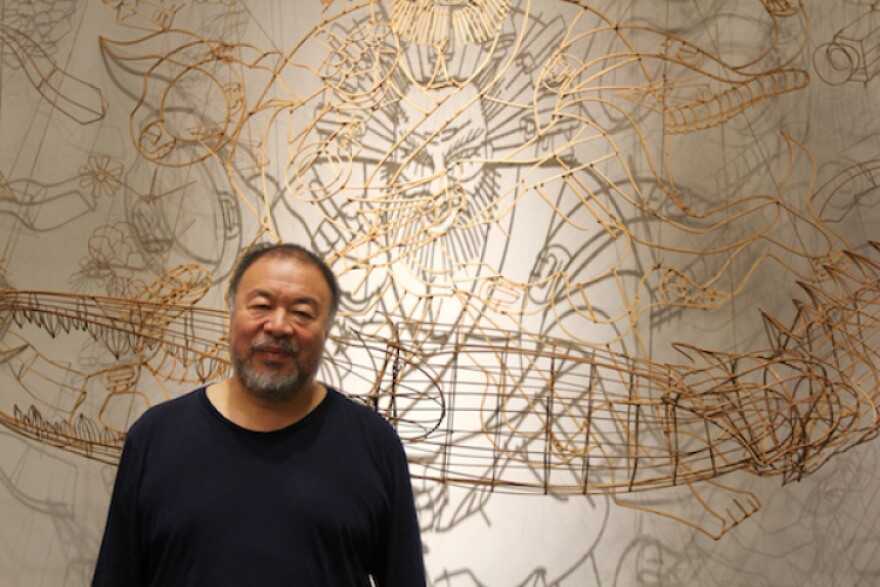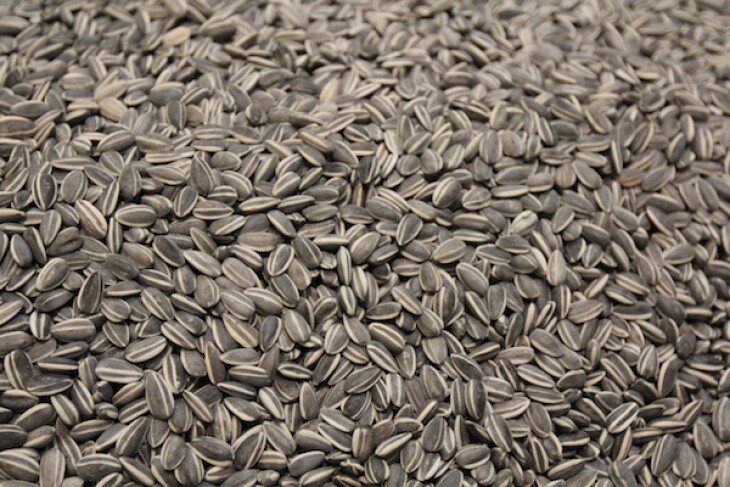Truth matters. Community matters. Your support makes both possible. LAist is one of the few places where news remains independent and free from political and corporate influence. Stand up for truth and for LAist. Make your year-end tax-deductible gift now.
Art On Display At Ai Weiwei's LA Exhibit Was The Last Thing Shipped Before His Studio Was Destroyed

Chinese artist and activist Ai Weiwei has never been constrained by his circumstances. As a child, when his family was exiled in a remote, barren area of northwest China, he was still able to scrounge together enough bamboo to make high-flying kites.
In 2011, Ai was arrested and detained for 81 days. His passport was confiscated and his Shanghai studio was demolished, but he continued to make art with the help of volunteers outside China.
He got his passport back in 2015 and is now based in Berlin, but his criticism of the Chinese government means he's still a focus of authorities there. This August, his main studio in Beijing was destroyed without any warning.
"Life Cycle," the new work he has on display now at the Marciano Art Foundation in L.A., made it out just days before the demolition crews rolled in. The sculpture is a bamboo pontoon boat carrying 113 figures -- some standing, some sitting, some with heads of creatures of the Chinese zodiac. It was constructed by Chinese artisans using ancient kite-making techniques.
The lesson Ai says he took away is that "physical beings are so fragile. Everything we have today can disappear."

"Life Cycle" is both fragile and beautiful, and also a representation of the human condition for Ai Weiwei. It's "as light as our spirit, as our spirit for freedom, our spirit for humanity being as one," he told KPCC's The Frame.
It's also of course a commentary on the world refugee crisis. While refugees are often viewed as dangerous, or as problem to be solved, Ai says refugees should instead be appreciated for the opportunities they offer:
"To understand, to communicate, to accept our differences, to adjust our narrow minds and to show our ability to have compassion and help others. It's a very easy thing to do and it's absolutely necessary."
Another installation called "Sunflower Seeds" (2010) is what you first encounter when you walk into the exhibition space at the Marciano. It's a massive gray square laid out on the concrete floor.
It's made up of 50 million tiny porcelain seeds.

For Ai, this installation also relates to the refugee crisis.
"We have a hard time understanding the numbers of actual physical beings. If you talk about this, it's only about 50 million seeds. So then you realize, OK, this is massive. It's unthinkable. But compared to today's refugee situation, it's 68 million, which is much larger than this," Ai says. "Think about those seeds -- if you see them as children or women, then you reevaluate today's human condition. You see something's got to be wrong to have a situation like that."
Back down by the "Life Cycle" sculpture, another installation called "Windows" (2015) surrounds it along the walls. It consists of two- and three-dimensional bamboo sculptures, some that reference Ai's life.
There are surveillance cameras, a cluster of hands giving the middle finger, a replica of the MRI of Ai's brain after he was beaten by Chinese police in 2009, and a self-portrait.
"It looks very friendly, Buddha-like. It has all those surveillance cameras pointed [towards my] head. But if you see a shadow of it, it's almost a like a crazy guy with his [middle] finger flipped," Ai says. "The shadow and the reality creates two layers of personality there."
Ai has shown his artwork all over the world, but the show at the Marciano Art Foundation marks his first major solo exhibition in Los Angeles. Ai says the unique character of the city is something that may color how people here experience the art.
"Los Angeles is a new land, a new city, in the United States and especially culturally has a strong character. And in recent decades [is] booming, in relation to culture and art," Ai says. "It's a very mixed immigration area, [and] has very strong, different cultural dimensions. So I think it gives maybe a possibility for people to feel some kind of vibration of the art being presented here."
"Ai Weiwei: Life Cycle" is at the Marciano Art Foundation through March 3. Ai also has pieces on view at the Jeffrey Deitch Gallery in Hollywood and beginning October 4 at the UTA Artist Space in Beverly Hills.
You made it! Congrats, you read the entire story, you gorgeous human. This story was made possible by generous people like you. Independent, local journalism costs $$$$$. And now that LAist is part of KPCC, we rely on that support. So if you aren't already, be one of us! Help us help you live your best life in Southern California. Donate now.








